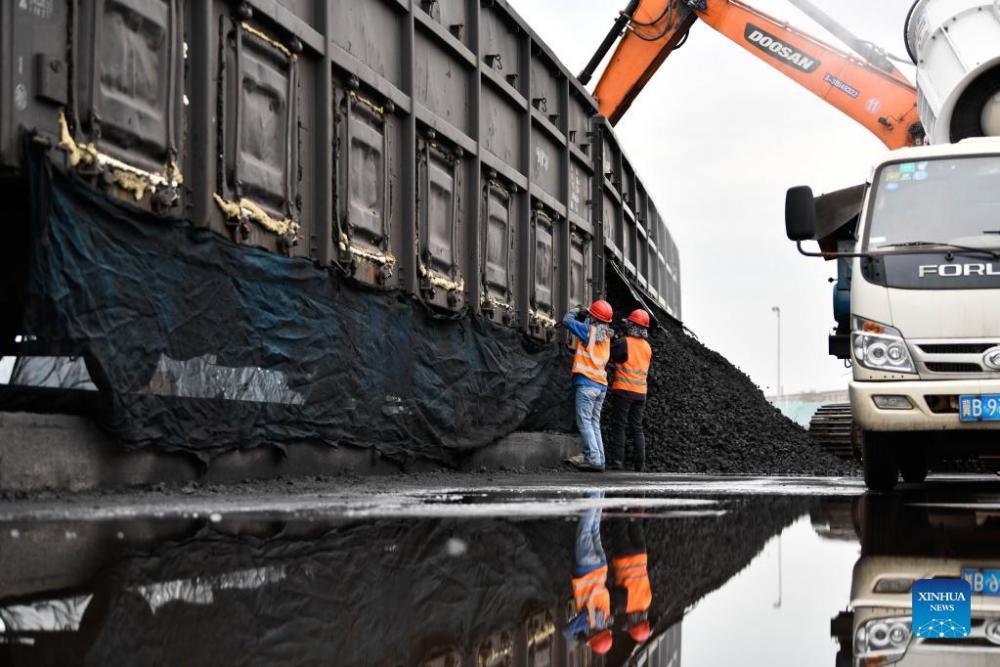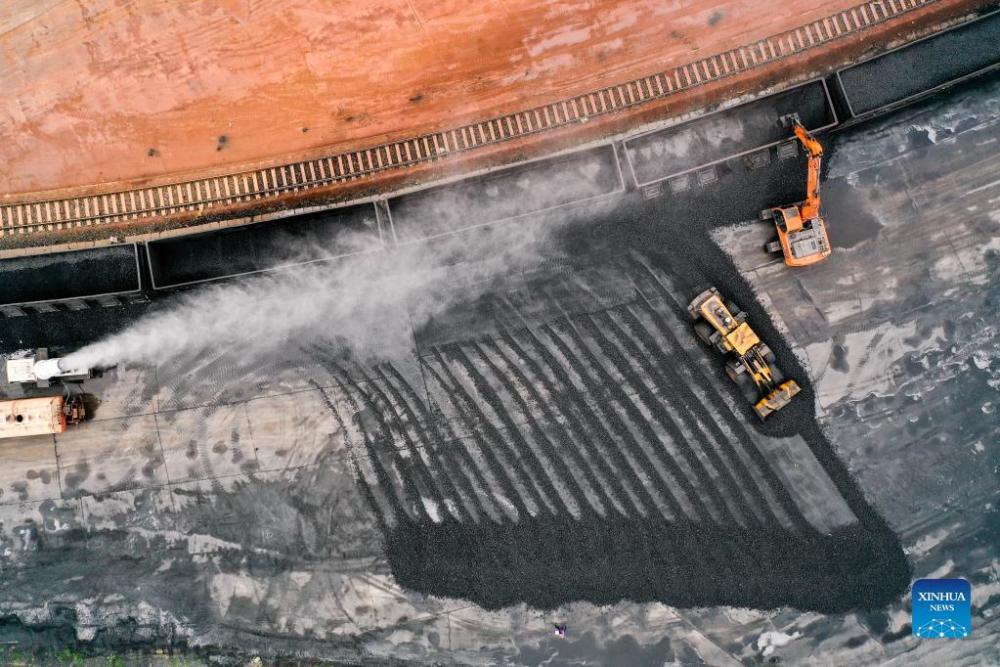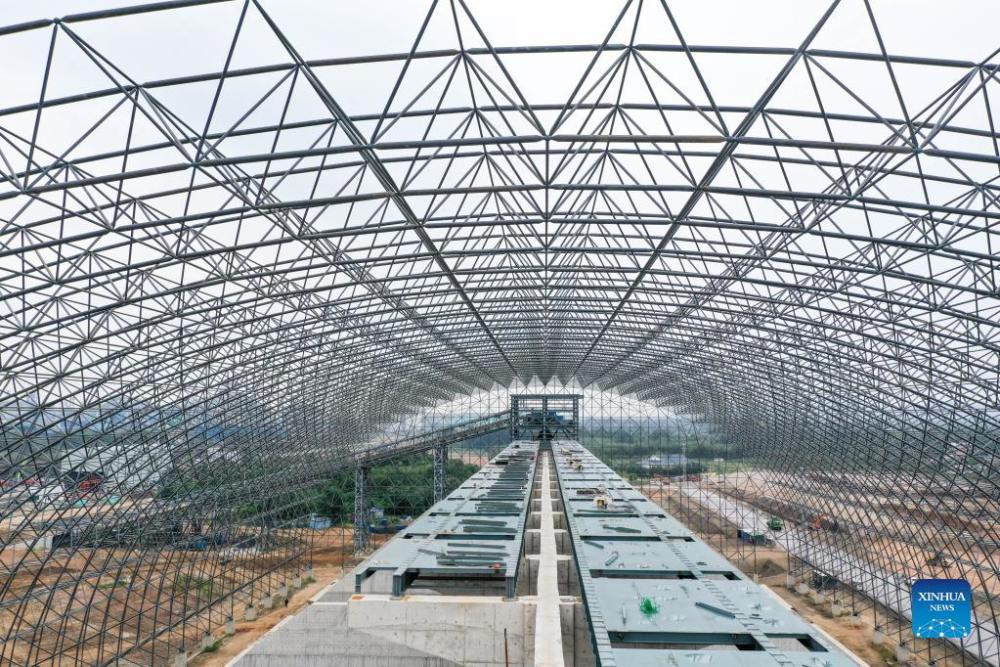|
Engineers check equipment at the construction site of a "road-to-rail" project in Qian'an Ctiy, north China's Hebei Province, Sept. 16, 2021. Qian'an in Hebei Province is a major county in steelmaking industry in north China, with a large transportation demand for raw materials such as iron ore, coal and coke. In order to reduce pollution and traffic congestion caused by road transportation of bulk goods, special railway lines for key iron and steel enterprises have been built under a "road-to-rail" scheme, which paved the way for a greener and more efficient logistics channel for local steelmaking. Since 2019, Qian'an has invested more than 311 million U.S. Dollars and built five dedicated railway lines based on the existing three railways, with a total mileage of 45.58 km and an annual transport capacity of 60 million tonnes. Under the "road-to-rail" scheme, supply of raw materials is ensured, logistics costs are reduced, while market competitiveness increases. The city's ecosystem has also benefited from the scheme. In 2020, air quality in Qian'an improved substantially, as road transportation volume dropped by 26 million tonnes. (Xinhua/Mu Yu) Workers unload coke from a train at a logistics yard in Qian'an Ctiy, north China's Hebei Province, Sept. 16, 2021. Qian'an in Hebei Province is a major county in steelmaking industry in north China, with a large transportation demand for raw materials such as iron ore, coal and coke. In order to reduce pollution and traffic congestion caused by road transportation of bulk goods, special railway lines for key iron and steel enterprises have been built under a "road-to-rail" scheme, which paved the way for a greener and more efficient logistics channel for local steelmaking. Since 2019, Qian'an has invested more than 311 million U.S. Dollars and built five dedicated railway lines based on the existing three railways, with a total mileage of 45.58 km and an annual transport capacity of 60 million tonnes. Under the "road-to-rail" scheme, supply of raw materials is ensured, logistics costs are reduced, while market competitiveness increases. The city's ecosystem has also benefited from the scheme. In 2020, air quality in Qian'an improved substantially, as road transportation volume dropped by 26 million tonnes. (Xinhua/Mu Yu) Aerial photo taken on Sept. 16, 2021 shows transport vehicles unloading coke from a train under dust control measures at a logistics yard in Qian'an Ctiy, north China's Hebei Province. Qian'an in Hebei Province is a major county in steelmaking industry in north China, with a large transportation demand for raw materials such as iron ore, coal and coke. In order to reduce pollution and traffic congestion caused by road transportation of bulk goods, special railway lines for key iron and steel enterprises have been built under a "road-to-rail" scheme, which paved the way for a greener and more efficient logistics channel for local steelmaking. Since 2019, Qian'an has invested more than 311 million U.S. Dollars and built five dedicated railway lines based on the existing three railways, with a total mileage of 45.58 km and an annual transport capacity of 60 million tonnes. Under the "road-to-rail" scheme, supply of raw materials is ensured, logistics costs are reduced, while market competitiveness increases. The city's ecosystem has also benefited from the scheme. In 2020, air quality in Qian'an improved substantially, as road transportation volume dropped by 26 million tonnes. (Xinhua/Mu Yu) Engineers check equipment at the construction site of a "road-to-rail" project in Qian'an Ctiy, north China's Hebei Province, Sept. 16, 2021. Qian'an in Hebei Province is a major county in steelmaking industry in north China, with a large transportation demand for raw materials such as iron ore, coal and coke. In order to reduce pollution and traffic congestion caused by road transportation of bulk goods, special railway lines for key iron and steel enterprises have been built under a "road-to-rail" scheme, which paved the way for a greener and more efficient logistics channel for local steelmaking. Since 2019, Qian'an has invested more than 311 million U.S. Dollars and built five dedicated railway lines based on the existing three railways, with a total mileage of 45.58 km and an annual transport capacity of 60 million tonnes. Under the "road-to-rail" scheme, supply of raw materials is ensured, logistics costs are reduced, while market competitiveness increases. The city's ecosystem has also benefited from the scheme. In 2020, air quality in Qian'an improved substantially, as road transportation volume dropped by 26 million tonnes. (Xinhua/Mu Yu) A worker welds building materials at the construction site of a "road-to-rail" project in Qian'an Ctiy, north China's Hebei Province, Sept. 16, 2021. Qian'an in Hebei Province is a major county in steelmaking industry in north China, with a large transportation demand for raw materials such as iron ore, coal and coke. In order to reduce pollution and traffic congestion caused by road transportation of bulk goods, special railway lines for key iron and steel enterprises have been built under a "road-to-rail" scheme, which paved the way for a greener and more efficient logistics channel for local steelmaking. Since 2019, Qian'an has invested more than 311 million U.S. Dollars and built five dedicated railway lines based on the existing three railways, with a total mileage of 45.58 km and an annual transport capacity of 60 million tonnes. Under the "road-to-rail" scheme, supply of raw materials is ensured, logistics costs are reduced, while market competitiveness increases. The city's ecosystem has also benefited from the scheme. In 2020, air quality in Qian'an improved substantially, as road transportation volume dropped by 26 million tonnes. (Xinhua/Mu Yu) Aerial photo taken on Sept. 16, 2021 shows the construction site of a "road-to-rail" project in Qian'an Ctiy, north China's Hebei Province. Qian'an in Hebei Province is a major county in steelmaking industry in north China, with a large transportation demand for raw materials such as iron ore, coal and coke. In order to reduce pollution and traffic congestion caused by road transportation of bulk goods, special railway lines for key iron and steel enterprises have been built under a "road-to-rail" scheme, which paved the way for a greener and more efficient logistics channel for local steelmaking. Since 2019, Qian'an has invested more than 311 million U.S. Dollars and built five dedicated railway lines based on the existing three railways, with a total mileage of 45.58 km and an annual transport capacity of 60 million tonnes. Under the "road-to-rail" scheme, supply of raw materials is ensured, logistics costs are reduced, while market competitiveness increases. The city's ecosystem has also benefited from the scheme. In 2020, air quality in Qian'an improved substantially, as road transportation volume dropped by 26 million tonnes. (Xinhua/Mu Yu) 来源:Xinhua |
“Road-to-rail” project under construction in Qian&#3
时间:2024-02-08 22:25 来源:网络整理 转载:我的网站






